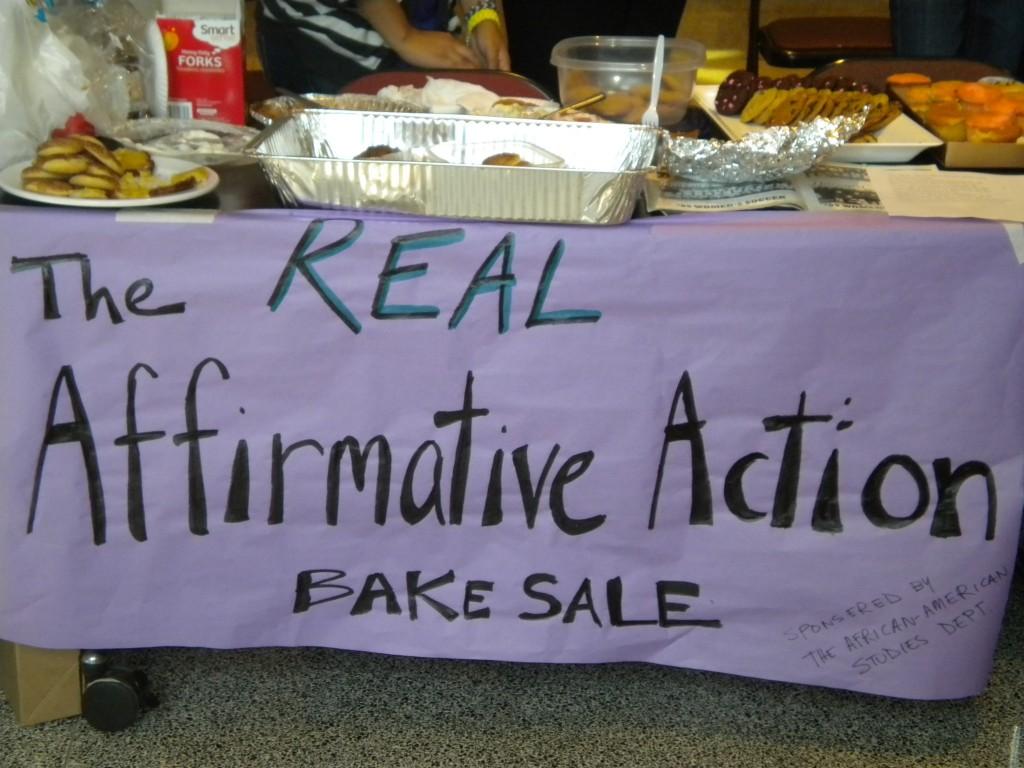Bake Sale Held at Fordham to Educate Students on Real Affirmative Action
Event Held in Response to University of California Berkeley’s “Promote Diversity Bake Sale”
October 8, 2011

On Oct. 7, Fordham held a bake sale in the McGinley student center at the Rose Hill campus called “The Real Affirmative Action Bake Sale” in response to the University of California Berkeley’s “Promote Diversity” bake sale. The bake sale at Berkeley, according to some Fordham students, did not “factually represent the breakdown of affirmative action.” Organized by the 18 students in Professor Mark D. Naison’s Affirmative Action senior values class, the purpose of the bake sale at Fordham was to educate students about who really gets a break in the college admission process.
“Professor Naison mentioned the idea in class one day, and we just took it and ran with it,” said Chris DeRose, Fordham College at Rose Hill (FCRH) ’12 and student in the class. DeRose said that the figures Berkeley used to price its baked goods “weren’t true. They were based on opinion.”
Patrice Edwards, FCRH ’12 and also a student in the class said, “We want to break down the stigma on affirmative action—the stigma that it’s only benefiting minority students. When you look at it, it’s not a black and white issue. Both groups are benefiting. We are presenting the facts and showing what affirmative action really is.”
After researching national trends in the college admittance process, Naison’s class compiled a pricing structure based on what they felt accurately represented which groups of people have a better chance of getting into college. The costs for the baked goods were as follows: women (general admission) $1.30, men (general admission) $1.25, underrepresented minorities $1.00, legacies (children of alumni) $1.00, recruited athletes $.50 and children of the very wealthy $.25. At Berkeley, the pricing was different. White students were charged $2, Asians $1.50, Hispanics $1.00, black students $0.75 and American Indians $0.25.
Edwards explained the price breakdown. “The people who get the most benefit pay the least. But race comes into play. So if you’re a woman but you are black, you pay $1.00 instead of $1.30.”
According to Naison, professor of African American Studies and History, the Affirmative Action class is around two-thirds Black, Latino and Asian, and many of them have faced the idea that they are only in a good college because of affirmative action.
“When we were having our first discussions in class, there was a widespread perception that minority students are in really good schools because they are getting a break,” Naison said. “Then, when the bake sale [at Berkeley] took place, which had lower pricing for women and minorities, it seemed like that was reinforcing the stereotype that minorities are the exception to meritocratic admission process.”
The bake sale was not in response to anything going on specifically at Fordham because they had no statistics on it, according to Naison. Rather, it was to educate people about what is occuring in colleges nationally. He said that while the faculty was “overwhelmingly supportive” of the bake sale, not all students agreed with it.
“This information makes people uncomfortable,” Naison said. “You think of college as a meritocracy, where people have a blank slate and whoever has highest grades, SATs, interesting applications get in and when you find out there’s all this other criteria it can be really disturbing.”
The bake sale raised nearly $200 and proceeds went to P.O.T.S. soup kitchen.
Additional reporting by Monique John.











